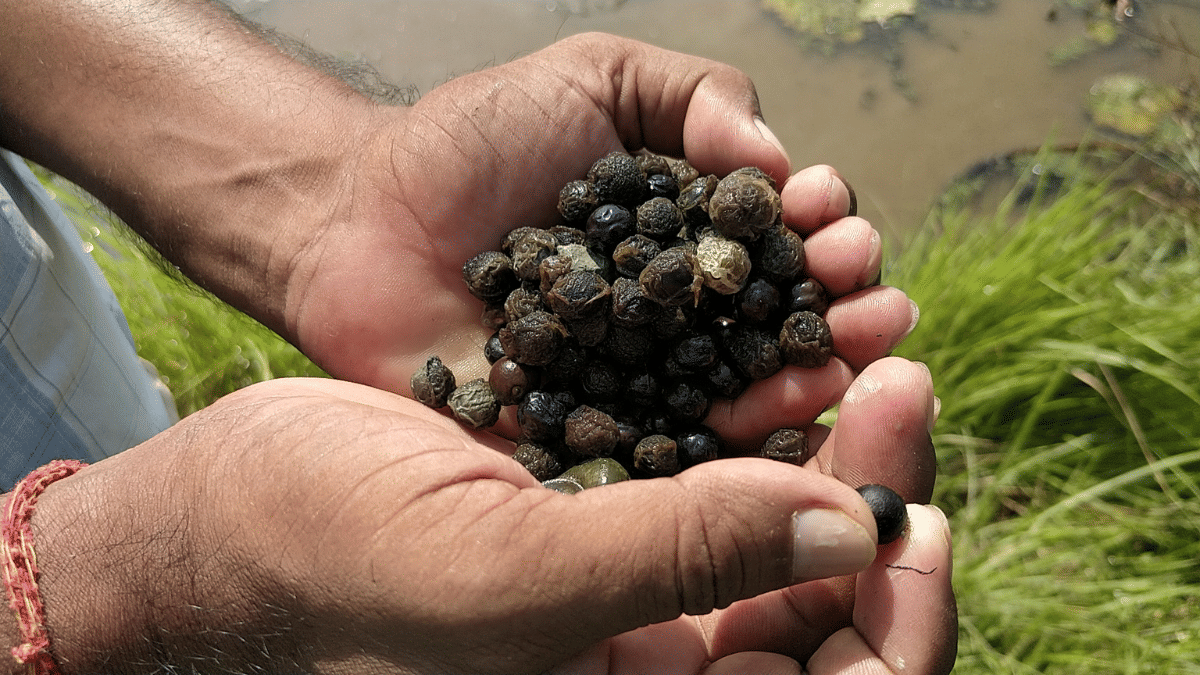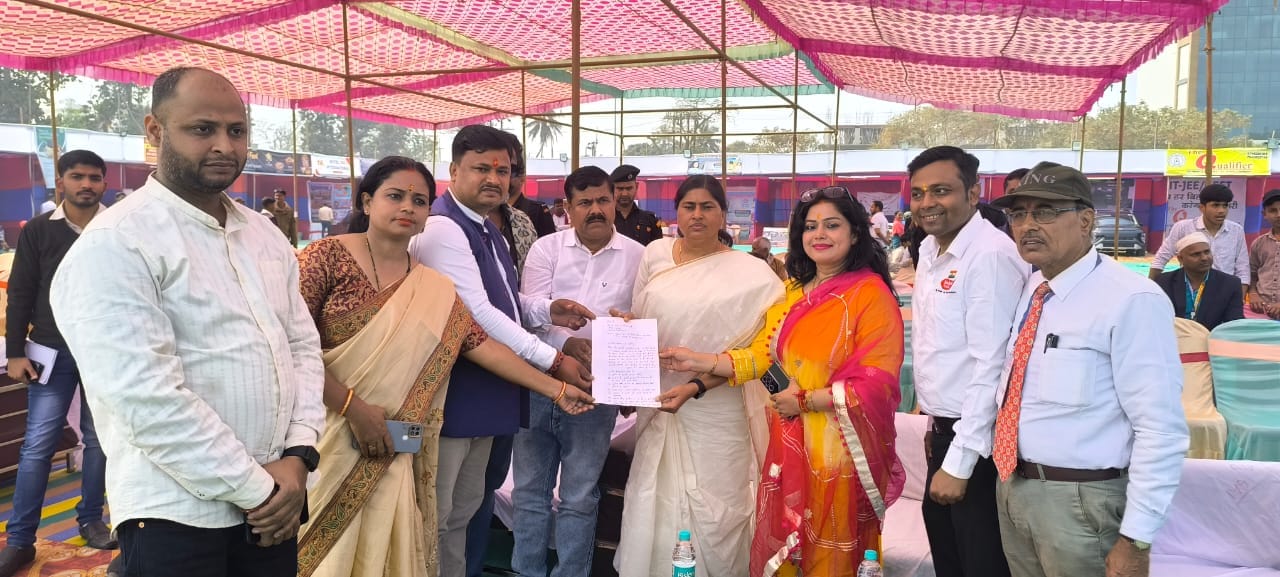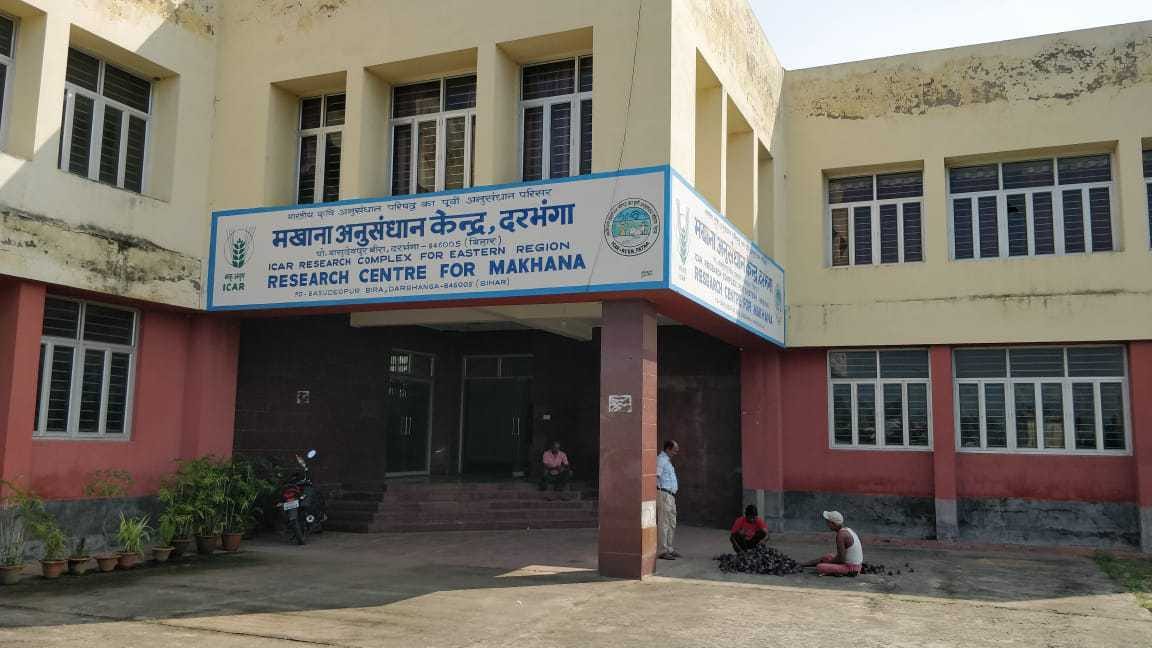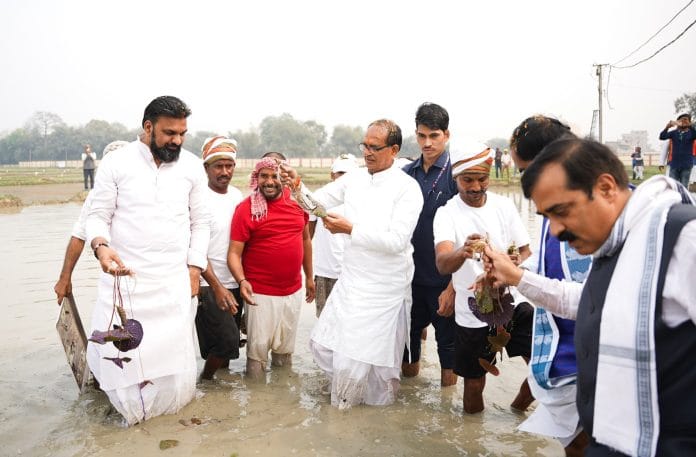New Delhi: Hundreds gathered on the streets of Bihar’s Purnea, armed with blazing bamboo torches. From Kosi-Seemanchal ki hakmari ke khilaf halla bol (raise your voice against the usurpation of Kosi-Seemanchal’s rights) to Purnea mange Makhana Board (Purnea wants a Makhana Board) protesters chanted several passionate slogans before a complete shutdown in the Katihar and Purnea districts.
The announcement of a Makhana Board in the Union Budget has unleashed a new competitive war of provinces. Where is the makhana capital – Darbhanga or Purnea? What was initially an economic decision has turned into a highly politicised one.
“We will not tolerate dirty politics on the Makhana Board. PM gives the slogan of Look East and ignores Seemanchal Kosi—the most backward region that is the gateway to the Northeast. If this continues, we will launch a janyudh (people’s war),” said Pappu Yadav, MP from Purnea, who called the shutdown on 24 February.
Finance Minister Nirmala Sitharaman’s recent announcement has polarised the people of Darbhanga and Purnea. Local politicians, activists, farmer leaders, media houses, traders to makhana entrepreneurs have begun to weigh in by writing letters to ministers. Union Agriculture minister Shivraj Singh Chouhan’s recent interaction with makhana farmers in Darbhanga intensified the divide.

Purnea and its neighbouring district Katihar is the biggest producer of makhana, or fox nut, in Bihar. Out of the 35,000 hectares of land utilised for makhana cultivation in the state, nearly 14,000 hectares fall within these two areas.
At the heart of the makhana controversy lies the perceived uneven distribution of benefits and opportunities. While some see the Makhana Board as a boon for the region’s economy, others claim it will only serve to widen the existing economic and social disparities between Purnea and Darbhanga.
“We are demanding a Makhana Board in Purnea on the basis of facts as it is the biggest producer of makhana, and every year lakhs of people come to the district for makhana-related jobs. There should not be vote bank politics on this,” said Manish Kumar, a Purnea-based makhana entrepreneur and the founder of Farm2Factory.
Darbhanga vs Purnea
A week after the Budget announcement, makhana entrepreneurs, local traders, and activists are busy lobbying for a Makhana Board in Purnea.
On 20 February, Manish Kumar and a few other businessmen met the state food and consumer protection minister Leshi Singh, and submitted a seven-point memorandum.

“The minister assured us that she would examine these demands on the basis of facts,” said Kumar.
According to Kumar, over two lakh people from Darbhanga and Madhubani migrate to Purnea annually for seasonal jobs in the makhana industry. “They come here because the market for makhana has developed in Purnea. The Kosi-Seemanchal area produce more than 70 per cent of makhana in the state. After 2015, many big companies have built their warehouses here,” he said.

Meanwhile, farmer leaders in Purnea are busy explaining the importance of a Makhana Board to producers.
“We have held several meetings so far and are making farmers aware of how important it is to form the Makhana Board in Purnea. Purnea has become the centre point of makhana. We will not allow the board to be formed in Darbhanga under any circumstances,” said Anirudh Mehta, founder of the District Farmers Association, which submitted a memorandum to the sub-divisional officer on 21 February. Mehta said the board is expected to boost the production and export of makhana.
The commercial cultivation of the makhana crop is mainly limited to North Bihar’s Katihar, Darbhanga, Supaul, Kishanganj, Purnea, Saharsa, Araria, Madhepura and Madhubani districts.
The Kosi-Seemanchal region has raced ahead of Darbhanga and Madhubani, Bihar’s traditional makhana producing belts, to become the leading fox nut cultivator in a Rs 3,000 crore industry.
In 2022, Mithila Makhana was given the GI-tag due to the efforts of Bhola Paswan Shastri Agriculture College of the Bihar Agricultural University in Purnea. Now, it also pushing for a Makhana Board in Purnea.
“We have played a crucial role in procuring a GI tag for the makhana; we have a dedicated makhana research team that has developed the Sabour Makhana-1 variety, and is now working on another one. If the Makhana Board is formed in Purnea, the economic condition of the farmers of Seemanchal will change,” said DK Mahto, Principal, Bhola Paswan Shastri Agricultural College.
But according to the makhana entrepreneurs of Darbhanga, the GI tag has been given in the name of Mithila and not in the name of Kosi or Seemanchal.
“So, the board should be formed in Darbhanga. Makhana originated in Darbhanga-Madhubani and lakhs of people called fodiya from here go to Purnea to crack the makhana lava,” said Rachit Saraogi, who started his snack company Makhayo during the Covid-19 lockdown.
The board will organise the makhana industry and regulate the price fluctuation of the product, added Saraogi.
Also read:
Politics fuels debate
The controversy over the Makhana Board was further deepened when Union Agriculture Minister Shivraj Singh Chouhan visited Darbhanga.
“If the Makhana Board is formed in Bihar, it will be formed on the basis of the advice of farmer brothers,” said Chouhan while speaking to makhana producers in Darbhanga, adding that efforts will be made to “make our makhana popular all over the world.”
Purnea MP Pappu Yadav targeted Chouhan, inviting him to Kosi-Seemanchal to meet “real makhana farmers.”
Pappu Yadav is strongly demanding a makhana board for Purnea, while MP Gopal Thakur and MLA Sanjay Saraogi are demanding it for Darbhanga. During the meeting with Chouhan, Thakur pushed for a board in Darbhanga.
A few days before Chouhan’s visit, MLA Saraogi wrote to home minister Amit Shah, finance minister Nirmala Sitharaman, and commerce minister Piyush Goyal, also requesting them to select Darbhanga as the board’s headquarters.
However, the central government has not yet disclosed where the Makhana Board will be formed in Bihar.
“This issue has become political. The demand is increasing from both Purnea and Darbhanga. So, the government is not going to take any decision in haste as this is the election year. Chouhan’s visit to Darbhanga can also be seen as an effort to understand the current atmosphere,” said a senior official associated with this development.
The Makhana Board debate is raging in the local press.
A headline read: Makhana Board par andar hi andar foot raha lava, utpadan me Purnea awwal (Silent eruption over Makhana Board, Purnea leads in production). Another said Makhana Board ke liye sadak par utrega kisan sangh (Farmers’ union will take to the streets over Makhana Board). Politicians are sharing clippings of news articles, too. while social media websites are brimming with hashtags such as #MakhanaBoardPurniame.
The Mallah vote
Apart from traders and politicians, Mallah community members are keeping a keen eye on the Makhana Board. The Mallah community comprises traditional experts on makhana farming who have inherited the know-how from their ancestors.
Every year, lakhs of people from this community migrate from Darbhanga-Madhubani to Purnea. They hope that the formation of the board may bring some change in their lives.
“Our working conditions are very bad. We have to leave our home for many months with the whole family. Our views should also be considered when the board is formed,” said Sanjay Sahni, who hails from the Mallah community.
According to the 2023 Bihar caste survey, the Mallah community has a 2.61 per cent population in the state, making it politically important. About 40 seats of the Bihar Assembly come from the Kosi-Seemanchal area.
“The Narendra Modi government’s decision will strengthen the Mallah community. No one had paid attention to them till now,” said a senior state Bharatiya Janata Party (BJP) leader on condition of anonymity.
Vidyanath Jha, an eminent fox nut researcher and co-author of the 2003 book Makhana, pointed to the regions’ distinct geographies before recommending a solution. “There is a continuous shortage of water in Darbhanga, whereas there is no such scenario in Kosi-Seemanchal, due to which makhana cultivation is increasing there,” he said.
It has to be considered, according to Jha, that the people of Darbhanga-Madhubani have a monopoly in makhana harvesting and post-harvesting, while Purnea is its biggest market.
“This debate can be ended by creating separate wings of the board at both the places.”
(Edited by Zoya Bhatti)







Indians must boycott Makhana – it’s bland and tasteless.
Just because Nikhil Kamath (an idiot) loves them is no good reason to fall for them.